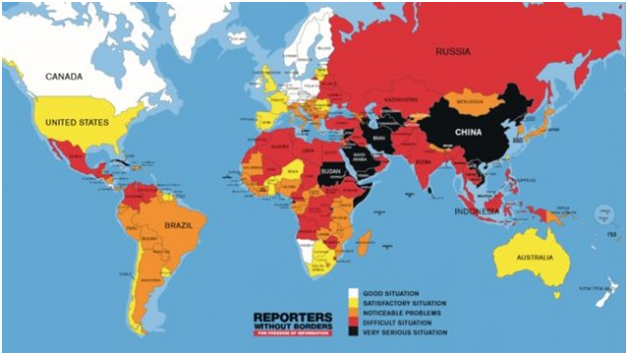Sharp Decline in Press Freedom, India in 'Very Difficult' Situation
Source: Reporters Without Borders

UNITED NATIONS (IPS): A leading advocacy group warns of a “worldwide deterioration in freedom of information” last year.
Out of the 180 countries being surveyed, two-thirds have slipped in standards compared to last year, according to the Reporters Without Borders’ World Press Freedom Index 2015. The best have become less near-perfect, and the worst have gotten even worse.
Finland and Eritrea remain at first and last place, respectively. Norway and Denmark are in 2nd and 3rd place, while Turkmenistan and North Korea are second runner-up and runner-up to Eritrea, respectively. India falls in the red coded “very difficult” situation despite being a democracy.
In an interview with IPS, the U.S. Director of Reporters Without Borders, Delphine Halgand, brought up several cases, including China “the world’s biggest prison for journalists”, and Azerbaijan, which has “managed to eliminate almost all traces of pluralism”.
Since 2002, Reporters Without Borders has been publishing the Index to measure the degree of press freedom. The Index is not a measure of the quality of media.
“It’s a way for anybody to be aware of how press freedom, journalists, are attacked, in many countries. Sometimes they don’t have any idea. Like, ‘we love to go to Turkey, we love to go to Vietnam, but we don’t have the idea that there’re so many news providers that are targeted in these beautiful countries.’ So it’s a way to highlight this very important issue,” said Halgand.
She said that this year, for the first time, a lot of the data has been made public in order to improve the transparency and methodology used in the Index, which uses qualitative and quantitative criteria.
The 2015 Index trends are grouped into seven causes:
- Total control – “Regimes seeking ever more information control” – in Eastern Europe, Africa, Asia, and the Middle East.
- Conflict – “News control – the powerful weapon of war” – such as in Ukraine, Syria, and Iraq.
- Lawless entities – “Non-state groups: tyrants of information” – such as Boko Haram, Islamic State, the Italian mafia and Latin American drug lords.
- Sacrilege – “Blasphemy: political use of religious censorship” – or the criminalisation of blasphemy, which the index says endangers freedom of information in approximately half of the world’s countries.
- Demonstration dangers – “The growing difficulty of covering demonstrations” – seeing an increase in violence against reporters and ‘netizens’ covering demonstrations.
- Gaps in the European Union – “European model’s erosion” – EU countries rank from 1st to 106th in the index.
- Laws – “‘National security’ – spurious grounds” – among authoritarian and democratic governments alike, to control independent speech.
Measuring up
Press freedom and how to measure it is a very complex question today, said Halgand.
“Press freedom in Sudan isn’t the same thing as press freedom in Italy. So that’s why we try to work around these seven criteria of pluralism, media independence, self-censorship, legislative frameworks, transparency, infrastructure, abuses.
“It’s a complex issue definitely and that’s why we need to use many criteria to try to be as precise as possible. But even if we try to put this complicated issue into criteria, of course the situation is always unique in each country,” she told IPS.
Charlie Beckett is professor at the London School of Economics (LSE) in the department of media and communications, and is also the director of Polis, which is the LSE’s journalism think tank.
“Whilst at some levels it’s very complicated,” he told IPS, “at some levels it’s very simple.
“If you look at journalists that have been put in jail, if you look at journalists who have been hurt physically, then it’s quite crude but that’s quite a good measure of basic journalistic freedom. And I know personally, I’ll start to worry about the more subtle things, such as disinformation, I’ll worry about them, but my life isn’t being threatened if I’m a journalist.
“So first give me my basic freedoms and you know, then we can talk about the more sophisticated problems.”
The more sophisticated problems include surges in data.
“I think it’s increasingly difficult to measure media freedom because increasingly media has become so complex,” Beckett told IPS.
“We live in a world where there is much more data available. But how we can trust that data, the source of that data, and how we might understand that data, is subject to all kinds of forces.
He explained that it is no longer straightforwardly about censorship, or laws, or even about the physical manifestation of violence against journalists.
There’s also the “chilling climate” wherein if one journalist gets killed, the other 99 are much more likely to do as they’re told, he said.
“Even where the press is publishing something, you don’t know under what circumstances. Are they being intimidated, are they being bribed, are they being pressurized?”
Another point is that “there’s no point in having free journalists if people aren’t free to share the information, for example, themselves”, as Beckett said.
(INTER PRESS SERVICE)



